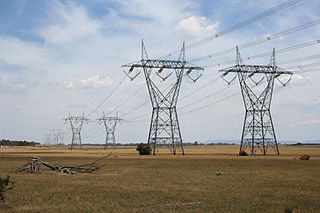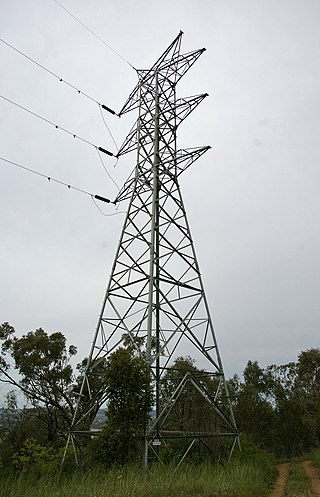
ATCO Ltd., operating as the ATCO Group, is a publicly-traded Canadian engineering, logistics and energy holding company based in Calgary, Alberta. ATCO's subsidiaries include electric utilities, natural gas production and distribution companies, and construction companies.
The National Electricity Market (NEM) is an arrangement in Australia's electricity sector for the connection of the electricity transmission grids of the eastern and southern Australia states and territories to create a cross-state wholesale electricity market. The Australian Energy Market Commission develops and maintains the Australian National Electricity Rules (NER), which have the force of law in the states and territories participating in NEM. The Rules are enforced by the Australian Energy Regulator. The day-to-day management of NEM is performed by the Australian Energy Market Operator.
Snowy Hydro Limited is an electricity generation and retailing company in Australia that owns, manages, and maintains the Snowy Mountains Hydro-electric Scheme that consists of nine hydro-electric power stations and sixteen large dams connected by 145 kilometres (90 mi) of tunnels and 80 kilometres (50 mi) of aqueducts located mainly in the Kosciuszko National Park. Snowy Hydro also owns and operates two gas-fired power stations in Victoria and one in New South Wales, three diesel power stations in South Australia and owns two electricity retailing businesses, Red Energy and Lumo Energy.

EnergyAustralia was a state–owned enterprise of the Government of New South Wales, Australia. It was electricity and gas supplier and retailer which primarily supplied the Sydney, Newcastle and Central Coast areas of New South Wales. Since market deregulation, it increased its focus on retail supply opportunities in electricity and gas to the Victorian market and electricity in the deregulated south–east corner of Queensland.
National Grid plc is a British multinational electricity and gas utility company headquartered in London, England. Its principal activities are in the United Kingdom, where it owns and operates electricity and natural gas transmission networks, and in the Northeastern United States, where as well as operating transmission networks, the company produces and supplies electricity and gas, providing both to customers in New York and Massachusetts.
EnergyAustralia is an electricity generation, electricity and gas retailing private company in Australia. It is one of the "big three" retailers in the National Electricity Market. It generates electricity primarily using coal fired generation, at the Yallourn Power Station in Victoria, and the Mount Piper Power Station in New South Wales. 10% of its generation is from wind power, 32% from gas, and 58% from coal. It is Australia's second biggest emitter of greenhouse gases, after AGL Energy. As a loss making company in 2023, its parent in Hong Kong, CLP Group, has stated that it is looking for partners for renewable energy investment, however as of this time, there were no plans to build new renewable energy itself.

Energex is an Australian-based wholly Queensland Government owned electricity company distributing power to 1.5 million homes and businesses in South East Queensland. The boundaries of the company’s distribution area stretch from Coolangatta in the south to Gympie in the north and as far west as the foothills of the Toowoomba range.
Alinta Limited was an Australian energy infrastructure company. It has grown from a small, Western Australia-based gas distributor and retailer to the largest energy infrastructure company in Australia. It was bought in 2007 by a consortium including Singapore Power and various parties which include the now defunct Babcock & Brown funds.

Origin Energy Ltd is an ASX listed public company with headquarters in Sydney. It is a major integrated electricity generator, and electricity and natural gas retailer. It operates Eraring Power Station, Australia’s largest coal-fired power station, in New South Wales, which it plans to close in 2025. In 2022, it was Australia's fourth largest climate polluter. It owns 20% of Octopus Energy, a UK renewable energy retailer, a stake potentially worth billions of dollars.
Powerco is the largest dual-energy distribution company in New Zealand by length, and is one of only two dual-energy distributors in the country.

Integral Energy was the second largest state-owned energy corporation in New South Wales, incorporated under the Energy Services Corporations Act 1995 from a merger between Prospect Electricity and Illawarra Electricity. Integral Energy was involved in electricity retail in addition to owning an electricity distribution network and previously held licences to retail electricity in the contestable markets covered by the NEM.

The energy policy of Australia is subject to the regulatory and fiscal influence of all three levels of government in Australia, although only the State and Federal levels determine policy for primary industries such as coal. Federal policies for energy in Australia continue to support the coal mining and natural gas industries through subsidies for fossil fuel use and production. Australia is the 10th most coal-dependent country in the world. Coal and natural gas, along with oil-based products, are currently the primary sources of Australian energy usage and the coal industry produces over 30% of Australia's total greenhouse gas emissions. In 2018 Australia was the 8th highest emitter of greenhouse gases per capita in the world.

Energy in Victoria, Australia is generated using a number of fuels or technologies, including coal, natural gas and renewable energy sources. Brown coal, historically, was the main primary energy source for the generation of electricity in the state, accounting for about 85% of electricity generation in 2008. The amount of coal-fired power has decreased significantly with the closure in 2017 of the Hazelwood power station which supplied around 20% of Victoria's electricity, and to a lesser extent with the exit of Anglesea power station in 2015. Brown coal is one of the largest contributors to Australia's total domestic greenhouse gas emissions and a source of controversy for the country. Australia is one of the highest polluters of greenhouse gas per capita in the world.

The Electricity Commission of New South Wales, sometimes called Elcom, was a statutory authority responsible for electricity generation and its bulk transmission throughout New South Wales, Australia. The commission was established on 22 May 1950 by the Electricity Commission Act 1950 to take control of power generation in the State. The commission acquired the power stations and main transmission lines of the four major supply authorities: Southern Electricity Supply, Sydney County Council, the Department of Railways and the Electric Light and Power Supply Corporation Ltd, also known as the Balmain Electric Light Company, the owner and operator of Balmain Power Station. The commission was responsible for the centralised co-ordination of electricity generation and transmission in the State, and some local councils continued to be distributors of electricity only.

SGSP (Australia) Assets Pty Ltd (SGSPAA), trading as Jemena, is an Australian company that owns, manages or operates energy infrastructure assets in the eastern states of Australia including Queensland and New South Wales, and gas pipelines and gas and electricity distribution networks in Victoria and the Northern Territory. It is 60% owned by State Grid Corporation of China and 40% by Singapore Power.

Energy in Australia is the production in Australia of energy and electricity, for consumption or export. Energy policy of Australia describes the politics of Australia as it relates to energy.

Lumo Energy is an Australian energy retailer operating in Victoria and South Australia, which has been wholly owned by Snowy Hydro since 2014. The business offers electricity and gas packages in Victoria and South Australia. As of October 2017, the business had almost 500,000 customers and a workforce of just under 500 people.
Australian Gas Networks Limited, formerly Envestra Limited, is an Australian energy company that operates natural gas transmission pipelines and distribution networks in South Australia, Victoria, Queensland, New South Wales, and the Northern Territory. The company owns distribution systems in a number of towns and metropolitan areas including Adelaide, Brisbane, Melbourne, Rockhampton, Albury, Alice Springs, Bundaberg and Whyalla. It outsources the operation and management of the assets to the APA Group.

The electricity sector in Australia has been historically dominated by coal-fired power stations, but renewables are forming a rapidly growing fraction of supply. In 2021, Australia's electricity production reached 265 TWh, with coal accounting for 52.9% and natural gas for 18.8%. Renewable sources, comprising solar, wind, hydro, and bioenergy with waste, collectively made up 26.7% of the total electricity generation mix.
United Energy is a Victorian energy network that distributes electricity across east and south-east Melbourne and the Mornington Peninsula to more than 640,000 customers, 90% of which are residential. Its network includes 209,000 poles and over 13,000 kilometres of wires. Electricity is received via 78 sub-transmission lines at 46 zone stations, where it is transformed from sub-transmission voltages to distribution voltages.













